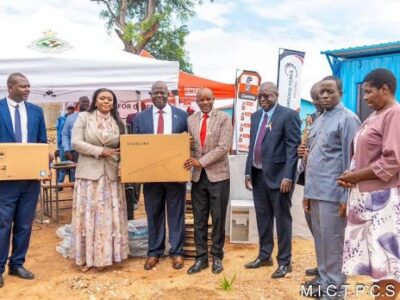Information and Communication Technology (ICT) Minister, Tatenda Mavetera, has called on SpaceX’s Starlink to significantly increase its internet capacity in Zimbabwe, particularly in urban areas, and to consider establishing a local ground station to improve service and infrastructure.
While Starlink’s satellite service has brought high-speed internet to rural Zimbabwe, transforming access for schools, clinics, and remote communities, Mavetera warned that the rapid growth of the service has led to challenges in urban areas where demand is now exceeding capacity.
“Starlink has been transformative for rural Zimbabwe, but the pressure on urban networks is mounting,” Minister Mavetera said during a courtesy call by Starlink executives’ event. “We need more capacity to meet the growing demand, and we need a local ground station to ensure reliable, scalable service.”
By Ruvarashe Gora
Starlink, in partnership with local provider Aura, has expanded its footprint, providing internet access to areas where traditional infrastructure has been limited or non-existent. Over 5 million global users have already benefited, with thousands of Zimbabweans now able to connect to the internet. However, the service’s rapid growth has exposed limitations in its ability to support urban areas.
With the government’s push to roll out over 6,000 Starlink terminals in the next three months, Mavetera emphasized that affordability remains a critical issue. The discrepancy between Starlink’s direct pricing and the rates charged by local resellers is a major concern, and Mavetera is urging Starlink to address these price variations.
“Our biggest challenge is ensuring that all Zimbabweans, including those in urban areas, can afford access,” Mavetera explained. “Aligning the prices will help us connect more people, which is key for our national development goals.”
In response, Joel Czechis from SpaceX acknowledged the concerns, pointing to the ongoing Starlink Impact Plan designed to provide affordable data for schools and community centers globally. Yet, the issue of capacity in urban areas and the need for a local ground station remain central.
“We’re working on increasing capacity and we understand the importance of addressing Zimbabwe’s unique challenges,” Czechis said. “Feedback like this is invaluable in helping us improve.”
Mavetera also reiterated Zimbabwe’s interest in developing local satellite infrastructure. The government has offered land for a potential Starlink ground station, which would allow for improved service and more direct control over the network.
“We are not looking to replace Starlink,” Mavetera emphasized. “We are looking to partner with you to build Zimbabwe’s capacity alongside your innovation.”
As Zimbabwe advances its Vision 2030 agenda for digital transformation, the partnership with Starlink could play a key role. However, Mavetera stressed that for the collaboration to succeed, the country needs not only expanded capacity and affordable pricing but also a more direct stake in space technology development.













Comments